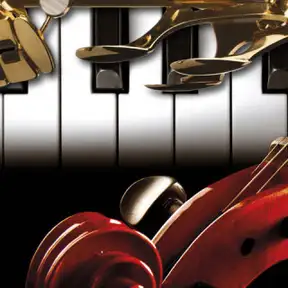La Musica di Ameria Radio del 17 febbraio 2022 musica di R. Schumann
PROGRAM
Robert Schumann (1810 - 1856)
Three Romances for Oboe and Piano, Op. 94
1. Nicht schnell
2. Einfach, innig
3. Nicht schnell
Heinz Holliger, oboe
Alfred Brendel, piano
Allegro in B minor for piano, op. 8
- Very soon
Maurizio Pollini, piano
Fantasy for Violin and Orchestra in C major, Op.131
- Im massigem Tempo. Lebhaft
Thomas Zehetmair, violin
Royal Concertgebouw Orchestra
Nikolaus Harnoncourt, director
Introduction and Allegro in D minor for piano and orchestra, op. 134
- Introduction. Ziemlich langsam
- Merry. Lebhaft
Murray Perahia, piano
Berliner Philharmoniker
Claudio Abbado, director
- With the Romances op. 94 let's take a step back to 1849, a particularly happy year in Schumann's troubled life. These are three small compositions with a tripartite shape (A-B-A) and with a delicate and almost salottier character; from the melancholy of the first to the serenity and melodic enchantment of the second, ending with the almost magical mystery of the third. Written for oboe, violin or clarinet, they are sometimes also performed with the cello.
- The Allegro op. 8, composed in 1831, was originally intended as the first movement of a Sonata, a Sonata that was never completed. It was published alone in 1835 with a dedication to Ernestine von Fricken, Schumann's girlfriend at the time.
Characteristic of the Allegro op. 8, brilliant work by 21-year-old Schumann, is therefore that the character of the piece is apparently improvisatory but that the construction is instead based on a meticulous interlocking of a few elements.
- Only in recent years Schumann's Fantasia for violin and orchestra op. 131 began to make its way into the repertoire of renowned soloists. Written in 1853, the work was commissioned by 22-year-old Joseph Joachim, who enthusiastically gave him approval.
- The «Allegro da Concerto» for piano and orchestra, op. 134 was composed in 1853, when the author was about to be the victim of a new very serious crisis, after those endured in 1833 and 1845, when he recommended his hospitalization in the health home of Doctor Richarz in Endenich. This score is also dedicated to his wife Clara.
- With the Romances op. 94 let's take a step back to 1849, a particularly happy year in Schumann's troubled life. These are three small compositions with a tripartite shape (A-B-A) and with a delicate and almost salottier character; from the melancholy of the first to the serenity and melodic enchantment of the second to end with the almost magical mystery of the third. Written for oboe, violin or clarinet, they are sometimes also performed with the cello.
- The Allegro op. 8, composed in 1831, was originally intended as the first movement of a Sonata, a Sonata that was never completed. It was published alone in 1835 with a dedication to Ernestine von Fricken, Schumann's girlfriend at the time.
Characteristic of the Allegro op. 8, brilliant work by 21-year-old Schumann, is therefore that the character of the piece is apparently improvisatory but that the construction is instead based on a meticulous interlocking of a few elements.
- Only in recent years Schumann's Fantasia for violin and orchestra op. 131 began to make its way into the repertoire of renowned soloists. Written in 1853, the work was commissioned by 22-year-old Joseph Joachim, who enthusiastically gave his approval of him.
- The «Allegro da Concerto» for piano and orchestra, op. 134 was composed in 1853, when the author was about to be the victim of a new very serious crisis, after those endured in 1833 and 1845, which recommended his hospitalization in the health home of Dr. Richarz in Endenich. This score is also dedicated to his wife Clara.

